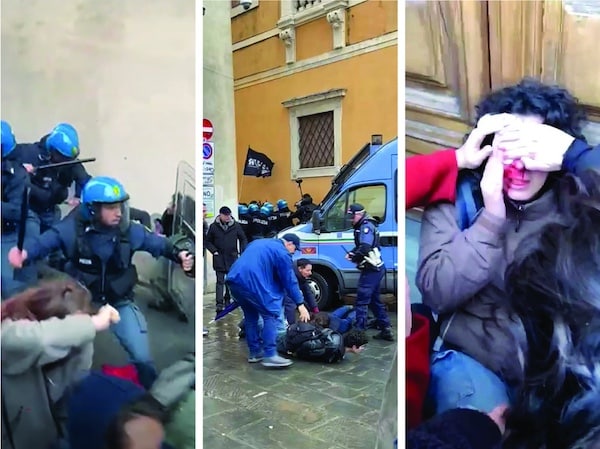President Mattarella’s message against the police violence perpetrated on the pacifist students in Pisa was not his first, but it was unusual in terms of the harsh words he employed. The president “pointed out” to Interior Minister Piantedosi that “the authority of the forces of law and order is not measured by their batons, but by the ability to ensure security while protecting the freedom to publicly express opinions.”
He ended in the clearest terms:
Batons against young people are an expression of failure.
This is a warning that cuts deep, directed at the Interior Ministry, the police, the government in general (on the same day that Meloni assumed leadership of the G7 in Kyiv) and the Lega in particular, whose representatives have unashamedly tried to justify the unprovoked violent police interventions that took place in Pisa and Florence.
The first episode was particularly egregious, as it involved entirely peaceful high school and university students, who even had their hands up, herded into a small alley and beaten to a pulp. The final tally was 13 injured, eight of them minors, and several detained. The official reason given for the police charge was to stop the attempt by the demonstrators (200 people in all) to get to Piazza dei Cavalieri without authorization for their protest. The day ended with a counter-protest of 10,000 people in the same square, this time in solidarity with the baton-wielders.
The FdI, through a note from its press office, rejected any responsibility whatsoever, in something like a response to Mattarella: “The left that is backing violent people is the cause of the riots we have witnessed.” Vice-Premier Tajani also reacted, albeit in more diplomatic tones:
Piantedosi will conduct a review, but law enforcement is not to be touched.
Pisa police chief Vittorio Pisani also promised a review of what happened:
Our officers have conducted operations that will have to be analyzed individually and reviewed scrupulously and transparently.
The Pisa Public Prosecutor’s Office has also opened a file on the police actions in question, with the investigation being entrusted to the Carabinieri. At present, their work consists of viewing the many videos and photos of the demonstration in order to assess whether or not the officers’ use of force was proportionate to the course of events. The police headquarters has already filed its own report with the prosecutors, accompanied by the videos shot by the officers of the DIGOS special security branch.
The first and shakiest-looking link in the chain of command is Sebastiano Salvo, Police Commissioner of Pisa since last summer, who spent almost all of his career in Genoa, where he was on duty as early as the time of the 2001 G8 protests. He has never been involved in inquiries or suspected of playing a role in the police violence back then; on the contrary, he has notably been one of the few active police officers who have spoken publicly about those dramatic events 23 years ago, criticizing the actions of the police. Nevertheless, on Sunday two hundred ultras already called for him to “go away,” demonstrating in the city streets before the match between Pisa and Venice.
However, it is clear that Interior Minister Matteo Piantedosi himself is in the crosshairs, between parliamentary questions, pressing calls for his resignation and Mattarella’s accusing words. He also has a background as a prefect, so he should have some notion of how public protests are managed. It is true that the number of demonstrations has multiplied since the situation in the Middle East escalated, but it’s also true that almost six months have passed since October 7 and, even amid all the innumerable decrees, no one at the Interior Ministry seems to have thought of a strategy for public order or the rules of engagement that the police must follow. This is a significant detail.
Likewise significant is the view of Genoa Deputy Prosecutor Enrico Zucca, who spoke of “selective violence” by law enforcement agencies:
This is used against students who are demonstrating for causes that the majority doesn’t like, but is not used against those who are demonstrating for other causes that are not perceived negatively, even if the latter don’t respect the rules.
One might harbor disquieting suspicions when looking at the sequence of events of the last few days: on Wednesday, during question time in the Chamber, Justice Minister Nordio shifted from his previous positions and agreed that there should be a review of the crime of torture with the aim of clarifying the legal framework in relation to police operations. Then, on Friday, the police intervened in force with batons against the students.
On Monday, at 6:30 p.m., in front of the Opera House in Rome, the High School Student Network of Lazio convened a protest in solidarity with those attacked, a short distance from the Interior Ministry. Among others, ANPI, ARCI, CGIL and the Roman branch of the PD announced their participation.

